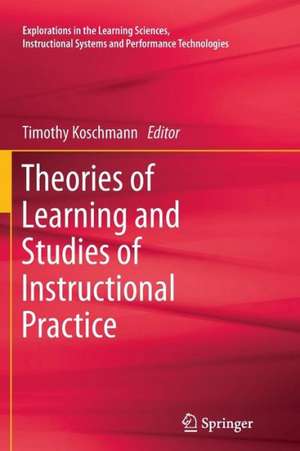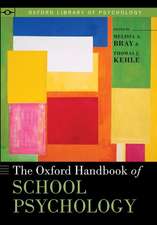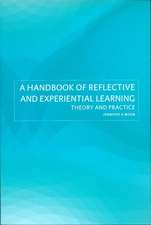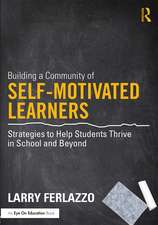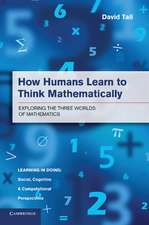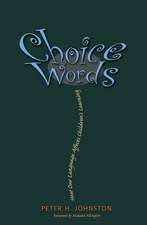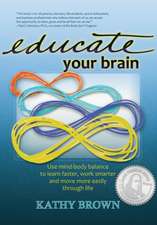Theories of Learning and Studies of Instructional Practice: Explorations in the Learning Sciences, Instructional Systems and Performance Technologies, cartea 1
Editat de Timothy Koschmannen Limba Engleză Paperback – 28 mai 2013
| Toate formatele și edițiile | Preț | Express |
|---|---|---|
| Paperback (1) | 948.93 lei 6-8 săpt. | |
| Springer – 28 mai 2013 | 948.93 lei 6-8 săpt. | |
| Hardback (1) | 955.40 lei 6-8 săpt. | |
| Springer – 26 apr 2011 | 955.40 lei 6-8 săpt. |
Preț: 948.93 lei
Preț vechi: 1157.23 lei
-18% Nou
Puncte Express: 1423
Preț estimativ în valută:
181.57€ • 190.09$ • 150.24£
181.57€ • 190.09$ • 150.24£
Carte tipărită la comandă
Livrare economică 07-21 aprilie
Preluare comenzi: 021 569.72.76
Specificații
ISBN-13: 9781461428671
ISBN-10: 146142867X
Pagini: 504
Ilustrații: XVI, 488 p.
Dimensiuni: 155 x 235 x 26 mm
Greutate: 0.7 kg
Ediția:2011
Editura: Springer
Colecția Springer
Seria Explorations in the Learning Sciences, Instructional Systems and Performance Technologies
Locul publicării:New York, NY, United States
ISBN-10: 146142867X
Pagini: 504
Ilustrații: XVI, 488 p.
Dimensiuni: 155 x 235 x 26 mm
Greutate: 0.7 kg
Ediția:2011
Editura: Springer
Colecția Springer
Seria Explorations in the Learning Sciences, Instructional Systems and Performance Technologies
Locul publicării:New York, NY, United States
Public țintă
ResearchCuprins
Section I: Introductions.- Ch 1: Theorizing Instructional Practice.- Ch 2: Invention in the Classroom: Structuring Natural Variability as Distribution.- Appendix A: Transcription conventions.- Appendix B: Classroom excerpts.- Section II: The Situated Action Perspective.- Ch 3: A Situative Perspective on Cognition and Learning in Interaction.- Ch 4: A Commentary on Incommensurate Programs.- Ch 5: Representational Competence: A Commentary.- Ch 6: The Interaction of Content and Control in Group Problem Solving and Learning.- Ch 7: Working Both Sides.- Responses to the Commentaries by Jim Greeno.- Section III: A Dialogic Theory of Learning.- Ch 8: Saying More Than You Know in Instructional Settings.- Ch 9: Schooling: Domestication or Ontological Construction?- Ch 10: Developing Fluency versus Conceptual Change.- Ch 11: From Dialectic to Dialogic.- Ch 12: Vygotsky and Teacher Education in the Knowledge Age.- Responses to the Commentaries by Jim Wertsch and Sibel Kazak.- Section IV: Transactional Inquiry.- Ch 13: A Transactional Perspective on the Practice-Based Science of Teaching and Learning.- Ch 14: On Plants and Textual Representations of Plants: Learning to Reason in Institutional Categories.- Ch 15: Contributions of the Transactional Perspective to Instructional Design and the Analysis of Learning in Social Context.- Ch 16: Transacting with Clancey’s “Transactional Perspective on the Practice-Based Science of Teaching and Learning.”- Ch 17: Making Sense of Practice in Mathematics: Models, Theories and Disciplines.- Responses to the Commentaries by Bill Clancey.- Section V: Synthesis.- Ch 18: Observations on the Observations.- Ch 19: Cultural Forms, Agency, and the Discovery of Invention in Classroom Research on Learning and Teaching.- Ch 20: Reflections on Practice, Teaching/Learning, Video, and Theorizing.- Ch 21: Does “Learning” Exist?
Textul de pe ultima copertă
Theories of Learning and Studies of Instructional PracticeTimothy Koschmann, editorThough there have been numerous calls for educational researchers to attend more closely to the details of how teaching is actually done, instructional practice remains an inadequately studied topic. Theories of Learning and Studies of Instructional Practice seeks to remedy this by helping construct a foundation for a practice-based science of instruction. It focuses on the fundamental question, what roles should theories of learning play in the study of instructional practice? In educational research, learning theories represent alternative conceptualizations of what we take learning to be. This volume examines three contemporary theories of learning with particular relevance to the study of practice, namely, situated learning, dialogic theory(or dialogism), and Deweyan transactionalism. Drawing upon a panel of internationally-prominent social scientists, psychologists, philosophers of education and teacher educators, the book critically evaluates the potential contributions of each to a science of instructional practice. Rather than considering these matters in the abstract, chapter authors illustrate their positions by applying the different treatments of learning to selected samples of instructional practice. The data analyzed come from a particular fifth-grade classroom in which an innovative way of teaching math was being tested. Extensive transcripts, images and exhibits are provided, enabling the reader to follow and evaluate the analytic arguments being presented. The volume, therefore, delivers precisely on its title—it provides both an articulation of current theories of learning and a series of carefully constructed studies of instructional practice, seeking to explore the relationship between them. In so doing the book offers no easy answers. Its purpose instead is to bring areas of controversy and confusion to the surface. For researchers and graduatestudents in the learning sciences, this provocative volume opens the door to the next crucial round of dialogue and debate.
Caracteristici
Organized into position papers, commentaries, responses, and synthesis chapters, facilitating a dialogic structure Grounds discussion into a common stet of material leading to collaborative analysis Includes primary data (transcripts, exhibits, images) Includes supplementary material: sn.pub/extras
